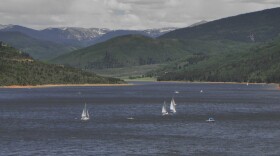Water managers are planning to send extra water from Ruedi Reservoir downstream this summer and fall. That’s to help out fish species in the Colorado River, but the effort is once again raising concerns.
Marty Joseph is manager of the Basalt outfitter Frying Pan Anglers. Brow furrowed, he said he’s worried by the news that the Colorado Water Conservation Board is hoping to once again release more water from Ruedi Reservoir later this year. Officials gathered earlier this week to talk about the plan.
"We didn’t attend the meeting Monday night in El Jebel because we were unaware it was for the public,” he said Tuesday afternoon. “We would have had five or 10 guys that would have showed up for the meeting, to support the cause for lower water in the later season.”
Joseph’s main concern is more water from the reservoir means higher flows. Last year about 9,000 acre feet were released in September and October. Frying Pan Anglers got more than 30 complaints from customers, 10 of them hand written, saying the higher flows made fishing unpleasant. It’s harder to get around the river at 300 cubic feet per second.
"It’s probably like a 30-, 40-mile an hour wind gust, trying to hold your balance there,” said Joseph, shaking his head. “Trying to stand waist deep in 300 cfs water is not going to happen. Especially not for an older gentleman.”
Normally the Fryingpan River is around 220 or 230 cfs, and men in their 50s and 60s is a key demographic for fishing guides.
Linda Bassi is overseeing the effort to release more water again this year. She’s with the Colorado Water Conservation Board. This time around, Bassi and others are aiming for 12,000 acre feet, which is more than last year.
“[But] we are going to attempt to coordinate to keep it close to that 250 cfs rate,” Bassi said by phone on Tuesday. “We will have more flexibility maybe release at a lower rate for a longer time."
Last year the 9,000 acre feet were sent downriver in only six weeks, in September and October. This year, if all goes as planned, the 12,000 acre feet would be released for three and a half months, starting in July.
But that’s no guarantee. There are other variables in the mix.
“What kind of snowpack we have and runoff, and how much is in storage," explained Bassi.
Keeping all those factors in mind, the Colorado Water Conservation Board hopes to finalize this year’s plan in May.




